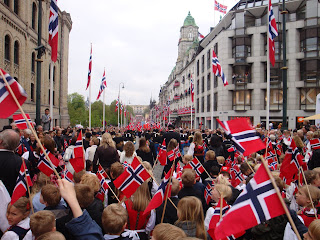
Today is officially the last day of my Comenius assistantship at Voksen Skole, in Oslo. It is time to look back, reflect on this whole experience, write the report, and send it to the National Agency.
It has been a wonderful year. I have learned and lived so many may different things, most of them good, although not all of them. Everything is very intense in these sort of situations, when you move to a totally new and unknown country, culture, weather, language. Being away from home and those whom you trust can sometimes be very hard and having to struggle with the financial and emotional problems only aggravated by the linguistic, cultural barriers can eventually make you want to give up.
It is very important to keep focused, stay open-minded, be helpful and friendly. Most of all, it is of the utmost importance to be independent and stay calm. Adapt and adjust and you'll be fine. But is it that easy?
The kindness of the people who welcome you to their country and their lives makes up for the not so cool things happening, though!
And like Nichiren Daishonen said "Never let life’s hardships disturb you … no one can avoid problems, not even saints or sages."
I will add more information regarding my experience as an assistant teacher later on.










